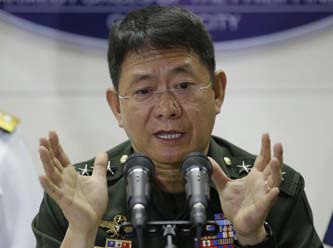
[av_one_full first min_height=” vertical_alignment=” space=” custom_margin=” margin=’0px’ padding=’0px’ border=” border_color=” radius=’0px’ background_color=” src=” background_position=’top left’ background_repeat=’no-repeat’ animation=”]
[av_heading heading=’Abu Sayyaf chief involved in beheadings killed – Año’ tag=’h3′ style=’blockquote modern-quote’ size=” subheading_active=’subheading_below’ subheading_size=’15’ padding=’10’ color=” custom_font=”][/av_heading]
[av_textblock size=” font_color=’custom’ color=”]
Thursday, April 13, 2017
[/av_textblock]
[av_image src=’http://www.panaynews.net/wp-content/uploads/2017/04/nation-abu-killed.jpeg’ attachment=’103143′ attachment_size=’full’ align=’center’ styling=” hover=” link=” target=” caption=’yes’ font_size=” appearance=’on-hover’ overlay_opacity=’0.4′ overlay_color=’#000000′ overlay_text_color=’#ffffff’ animation=’no-animation’]
Gen. Eduardo Año, chief of staff of the Armed Forces of the Philippines, gestures during a news conference at Camp Aguinaldo in Quezon City on Wednesday, April 12. AP
[/av_image]
[av_textblock size=” font_color=” color=”]
MANILA – Government troops battling militants on a central resort island killed a young Abu Sayyaf commander who was involved in the beheadings of two Canadians and a German and who had sailed far from the extremists’ southern jungle hideouts to capture more hostages, the military chief said on Wednesday.
Troops recovered and identified the remains of Moammar Askali at the scene of the battle in a coastal village in Bohol province, Armed Forces of the Philippines chief of staff Gen. Eduardo Año said. Five other Abu Sayyaf gunmen, three soldiers and a police officer were also killed in Tuesday’s clashes.
Año said captured Abu Sayyaf militants identified Askali from a photo troops took of the young militant leader after death, which confirmed that the gunmen who quietly cruised into Bohol on three motorboats Monday night then clashed with troops belonged to the Islamic extremist group. Askali, who used the nom de guerre Abu Rami, had partly served as an Abu Sayyaf spokesman in recent years.
“This is a major blow to the Abu Sayyaf,” Año told The Associated Press. “If they have further plans to kidnap innocent people somewhere, they will now have to think twice.”
Askali was an emerging hard-line leader of Abu Sayyaf and had pledged allegiance to the Islamic State group. He had received bomb-making training from Malaysian Zulkifli bin Hir, or Marwan, a top Southeast Asia militant leader who was killed in 2015, according to a police profile.
It was Abu Sayyaf’s first known attempt to carry out ransom kidnappings deep in the central Philippine heartland, far from the group’s jungle lairs in the southern provinces of Sulu and Basilan. Año said the troops were still hunting at least five Abu Sayyaf gunmen, though fighting had eased Wednesday.
While the bold kidnapping attempt appears to have been foiled, the militants’ success in penetrating the bustling region of beach resorts and other popular attractions could raise concern among tourists and businessmen.
Bohol lies about 640 kilometers southeast of Manila and is about an hour by boat from Cebu province, a trade and tourism center that has hosted some of the meetings of the Association of Southeast Asian Nations, the regional bloc the Philippines is leading this year.
Año said military intelligence operatives had been trying to track the movements of Askali’s group for several days after learning of their planned abductions.
The gunmen traveled on motorboats along a river to Barangay Napo, Inabanga town, where government forces assaulted them, military spokesman Colonel Edgard Arevalo said, adding that troops recovered four rifles and a homemade bomb from the dead gunmen.
The United States Embassy in Manila had earlier advised Americans to take precautions amid “unsubstantiated yet credible information” of possible kidnappings by terrorists in Bohol and other central areas.
The United States and the Philippines both list Abu Sayyaf as a terrorist organization for bombings, kidnappings for ransom and beheadings.
Abu Sayyaf militants have crossed the sea border with Malaysia on powerful speedboats and kidnapped scores of foreign tourists in past years, reflecting their growing capability and desperation for money. In 2001, they sailed as far as western Palawan province, where they seized 20 people, including three Americans, from a resort.
President Rodrigo Duterte has ordered troops to destroy the extremists and has threatened to declare martial law in the country’s south if the threat posed by the Abu Sayyaf and other extremist groups aligned with the Islamic State group gets out of control.
Although Abu Sayyaf have been weakened by years of battle setbacks, they beheaded two Canadians last year and a German hostage earlier this year after ransom deadlines lapsed. Askali was involved in those kidnappings and the captives’ gruesome murders, Año said.
The militants are still holding at least 29 captives in Sulu’s jungles, many of them foreign tugboat and cargo ship crewmen seized in the seas surrounded by southern Philippines, Malaysia and Indonesia. (AP)
[/av_textblock]
[/av_one_full]



